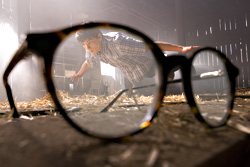Just when you’ve been Hulk-ed and Catwoman-ed and Fantastic Four–ed into never wanting to see another comic-book movie, Superman Returns is a pleasant, welcome surprise, eliciting the same warm feelings the people of Metropolis have for their homecoming hero. “Where have you been for these last five years?” they ask. The world has gone to hell during Superman’s absence; crime and catastrophe dominate the news. (Never mind Darfur or 9/11; the Daily Planet headlines are reassuringly unreal.) And we ask—”Where have you been all summer?” It’s not that we’ve been pining for a new man in tights, or a new and vastly expensive studio franchise, as Superman is destined to start. All the knocks against the original old DC Comics hero—he’s too square, too good, too simple—turn out to be a virtue. Or rather, as an agent of virtue, Superman leads by example, showing that goodness is simply dormant within our dark human hearts. Speaking from beyond the grave, Marlon Brando (as Superman’s father) opines, “They only lack the light to show the way.”
To which Kevin Spacey’s Lex Luthor might reply, “No, you fat space moron, we only lack the money to find the Fortress of Solitude, steal the secret crystals, grow a new continent to flood half the world, then stick a kryptonite knife in that bastard son of yours.” More light is not what this guy needs. While Superman (the suitably humble and certainly handsome Brandon Routh) has been visiting the graveyard of his home planet, Krypton, his adoptive mother (Eva Marie Saint) waiting anxiously back in Kansas, Lex has been busily marrying old widows, assembling a crew of prison goons, and dragging along Parker Posey (treated like a prop and weirdly dressed as if in a ’40s Barbara Stanwyck movie). Lex has motives we understand: money, revenge, and real estate. His crystal continent (Lex-land? Lex-opolis? Lex Mar Vista?) will make him the new Donald Trump: less hair, about the same level of taste, but far more beachfront property.
Superman’s upright agenda, like his alter ego, Clark Kent, isn’t so showy. Was there ever a guy who stopped a falling 777 with so much modesty? All superheroes—including those of director Bryan Singer’s first two X-Men movies—must live their lives partly in the closet. Only Superman actually seems content there. He’s not like Wolverine, busting for a brawl and a beer. Or like Spidey, longing to be an everyday Joe. His meek demeanor and laughable disguise—no one can recognize him in tie and glasses—speak to his nonschizoid appeal: With cape or without, he’s the same fundamentally decent, mild-mannered guy. (Though, in a scene that makes me love CGI all over again, one who can stop a bullet with his blue eyes.)
Not only does newcomer Routh startlingly resemble Christopher Reeve, he’s got the same pleasingly self-effacing manner. Back at The Daily Planet, where Lois Lane (Kate Bosworth) is now the parent of a 5-year-old son and girlfriend to another journalist (James Marsden), Clark’s return is barely noticed in the hubbub of the day’s big story. At the emergency staff meeting, editor Perry White (Frank Langella) makes the assignments: “Fashion—is that a new suit? Politics—does he still stand for truth?” Superman sells newspapers. Clark only works for one. And rather than forcing some big confrontation with Lois, the star reporter and Pulitzer-winning Superman debunker, he merely flies over her house like a super-stalker, using his X-ray vision to reveal the happy domestic scene within. Why spoil that?
Superman’s mythology, with strongly Christian overtones, is inescapably part of our culture. He’s a wholesome, conservative emissary, which suits our times. Superman Returns doesn’t pander to red-state biases, but it’s also targeted—like any blockbuster—at the broadest possible family audience. And its orphan hero’s struggles are intensely familial; he doesn’t feel himself a freak for his powers—he’s only isolated by his righteousness and the need to conceal it.
For this reason, Singer is spared the need for a lot of speeches and exposition. He doesn’t give Routh much to say, nor is Spacey allowed to cut loose like Jack Nicholson in Batman. There’s none of the sarcasm or knowing jokes that have cluttered up so many recent super-flicks. In its somewhat retro look, a kind of digital Deco, the movie harkens back to 1938, when the comic book first appeared. Not that the ’30s weren’t filled with wise guys, particularly in the Warner Bros. movies of the era, but Singer has made a calculated and successful effort to keep cynicism at bay. Except, of course, for Lex, whose villainy Spacey makes more modern and self-aware; he even has a videographer following him around—for an evil reality TV show, perhaps?
Superman speaks loudest through his actions, and Singer’s set pieces are pretty spectacular—airplanes falling, an earthquake splitting Metropolis, a yacht rescue on a jagged crystal pinnacle in the middle of the ocean. Still, it’s the quiet moments that I like best, and they also show what’s missing from Brett Ratner’s clamorous final X-Men installment and most summer movies in general. This Superman doesn’t grunt or jump to fly; it’s more a pure, silent levitation without the cartoon-bubble “Whoosh!” we imagine. Flashing back to Clark’s Kansas boyhood, the kid starts off bounding over cornfields like any adolescent joyously learning how his body is special. Then, crashing through a barn roof, he realizes he’s different on another level. Flying isn’t so much physical as an act of will—or even a moment of grace.
Young and attractive pre-stars Bosworth and Routh, cast for future sequel value (and salary caps), also have a charmingly bottled-up chemistry between them. Whatever their past history, they’re not about to surrender—again—to lust or hormones. Without so much as a kiss or a sex scene in the movie, the most romantic image of the summer has to be Bosworth slipping off her shoes before taking flight. She won’t need them in the air, where she’s safe—like those of us below—in the arms of her protector.








